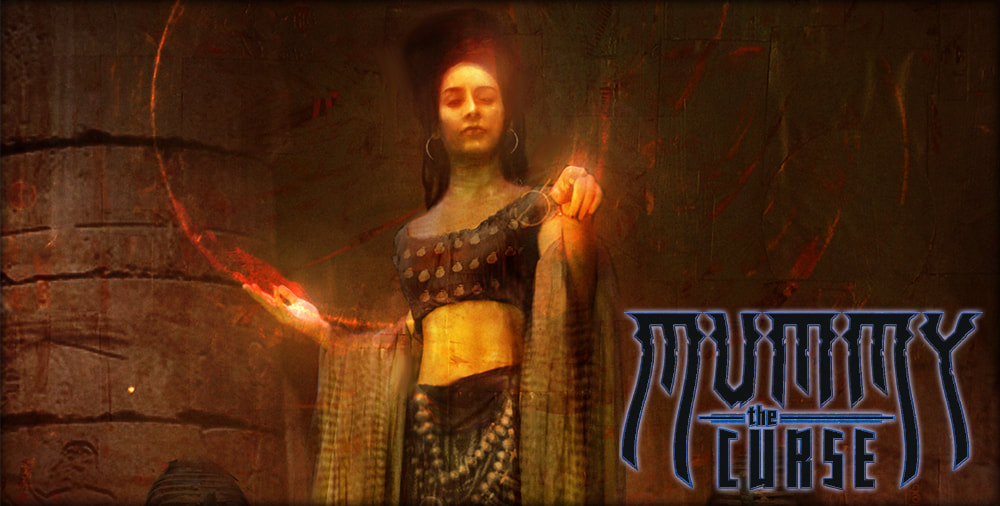|
In a world of vampires, werewolves, mages, and even stranger creatures, it can be hard to stand out. For White Wolf’s line of creature horror RPGs, it can be harder still to keep the formula fresh. The new World of Darkness series (later renamed Chronicles of Darkness) was built with uniformity in mind. Each creature type had 5 subtypes and 5 social groups that defined them. Therefore, even though some mechanics and flavor would change between, say, Vampire and Werewolf, much of the experience felt tired and formulaic. Enter Mummy: the Curse, one of the last of the creature RPGs to be released before the Chronicles shake up. Though it shares the same basic structure as the others in its line, Mummy wildly alters the game’s feel. Here I’ll discuss why it’s worth a look, even if that look is a brief one. 1) Inversion Of Power In most RPGs, characters raise their power levels through experience and fight to accomplish greater and greater tasks. In D&D, this means leveling up and going from protecting the town to saving the world. In World/Chronicles of Darkness, this means watching your creature gain dots in a powerful supernatural trait (Blood Potency for Vampires, Primal Urge for Werewolves). This gives them access to stronger supernatural abilities and allows them to eventually increase their attributes beyond normal mortal limitations. The creators of Mummy needed a different style, else their undead beasties would basically just be Vampire reskins. When the Mummy wakes, they begin play with the highest level of supernatural power available to them (called Sekhem). They still gain experience and can acquire new power or raise their skills, but their sheer capacity for supernatural influence begins at near divine levels. Over time, the Mummy loses its raw might, eventually returning to slumber once more until called again, This makes for a mighty opening to a campaign; players can take their Mummies to an ancient enemy’s stronghold within the first few sessions and accomplish the incredible with little planning. There must, then, be a balance to this power. This comes with Memory, the antithesis to the Mummy’s almighty Sekhem. 2) Limitations Of Memory In another major change, Mummies begin play with only 3 dots of their “morality” trait, less than half that of their creature counterparts. Memory not only serves as the morality rating of the Mummy, dictating what actions they can accomplish without compromising their human values, but also how much they recall about their previous awakenings and their origins. At 3 dots, they care little about inflicting harm on mortals, and can recall only vagaries about their previous existence. They know their name and their purpose, but little else. As the Sekhem wanes over time, Memory can increase. This replaces supernatural might with the personal history of the Mummy, uncovering the identities of past lovers, friends, and joys. The descent into madness and inhumanity that often accompanies World/Chronicle of Darkness games is here reversed, allowing for bursts of strength followed by a softening of one’s heart and one’s muscle. Will the Mummy break from their curse of unlife and find apotheosis amidst a world they scarcely recognize? Or will they ignore their relationships and connections in favor of accomplishing their duty, that they may again sleep? Suffice it to say this change has implications far beyond the mechanical. 3) Redesign Of Format It is possible to play Mummy: the Curse in the same fashion as other World/Chronicles games. Each player takes the role of a Mummy and works, mostly in concert, to secure vessels of power and combat supernatural foes. However, Mummy lends itself quite well to a distinct design. In our game, for instance, only one player controls a single Mummy. A second player is playing his timeless companion, a Sadikh. And all the other players are cultists, normal humans with little to no supernatural power. Because the Mummy is so powerful, it can be cumbersome to have a group of 4-6 of them running around, wrecking a city within hours of game start. With this new format, the Mummy must choose when to apply their power and when to use more subtle means. Cultists can make deals, get the Mummy on planes, and exploit important resources. This becomes even more meaningful when we take into account the fact that the Mummy cannot interact with most of humanity within the first few days of their reawakening. The cult acts as that important medium. And while they are fanatically loyal to the Mummy, they are still independent actors; their will is their own. It’s unwise to disobey the great master, but not impossible. If you play a lot of White Wolf or Onyx Path like I do, then you tend to know what to expect when you open one of their books. Mummy pleasantly surprises, and while the lack of a major power progression keeps it from being an effective years-long campaign, it certainly makes for a satisfying and interesting short one. David Horwitz is a gamer and freelance writer with an obsession for exploring new forms of leisure. If you’re looking for an inquisitive mind and a deft hand, or just want to chat about gaming, contact him at www.davidhorwitzwrites.com/contact. Picture Reference: http://theonyxpath.com/category/worlds/chroniclesofdarkness/mummythecurse/ Leave a Reply. |
All blog materials created and developed by the staff here at High Level Games Archives
April 2023
Categories
All
|
Proudly powered by Weebly




 RSS Feed
RSS Feed